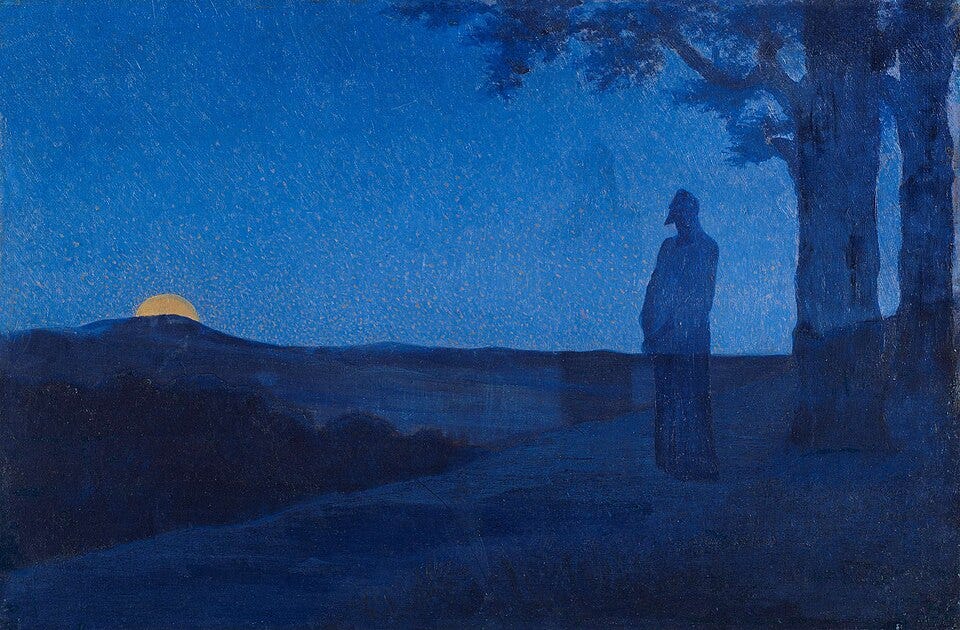
To clasp the hands in prayer is the beginning of an uprising against the disorder of the world.
—Karl Barth, Swiss theologian who wrote the Barmen Declaration adopted by Christians who opposed Nazi ideology in Hitler’s Germany.
Some weeks ago, I wrote about my predilection for identity markers.
In my life, I have worn many labels: emo kid, existentialist, Latino, and atheist, as well as Reformed Christian, transplant, socialist, social anarchist (i.e., whatever they believe in Norway). On this Substack, I’ve written with pride about being a nostalgic, a maladapted daydreamer, and a wonder junkie.
But while I will use words like artist or intellectual to describe how I approach the world—why I must always criticize and second-guess, why simple explanations rarely do—I’ve felt uneasy owning either term. Because artists go to private schools and live in New York City. They rent studios and drink $10 coffees. And intellectuals have trust funds that allow them to get PhDs in literature and use words such as syllogism and subordinate clause without having to consult Google. (They’re also snot-nosed turds, in most cases1.)
By happenstance, I finally found the word I’ve been searching for while flipping through the latest issue of Comment, in which Rich Villodas explored the spirituality of privacy and seclusion.
The term is contemplator2.
Contemplator does not appear in any modern English dictionary. But it was included in Charlton T. Lewis and Charles Short’s A Latin Dictionary, which was published for the first time in 1879. There, it is defined as “an observer, surveyor.” The term is also the title of a 1901 painting by Eugène Carrière, which illustrates the Victor Hugo poem “Boaz Asleep.”
When many of you hear it, I am sure it will click, for you too are among this tribe of people who collect nonsense, scribble in the margins during meetings, and stay up well past dark conflicted by the contradictions of a modern life in which the world is at our fingertips (or our doorsteps, if you subscribe to Amazon Prime), but the technologies we’re required to love are zapping our attention and, literally, killing us.3
There is no educational requirement or fancy title or socioeconomic status tied to this word. Mechanics contemplate, as do homemakers and architects. Heck, a CEO or two—not more—in this country may even have a worthwhile thought from time to time!
Research shows that those of us who carve out time to be alone, detached from the world’s nonsense, and pray or meditate exist on more solid ground. (Some, like Czech samurai Jiří Procházka become cage-fighting world champions). And while I rarely detach entirely, I certainly feel better when I’m inaccessible for a few hours on a trout stream with my phone off and no other human being in sight.
And so, I leave you this word to consider as you go about your week4.
Mine will be spent finishing up an audiobook project and re-watching The Motorcycle Diaries for an essay that I plan to share with Matthew Morgan at the Art of Conversation—a Substack contemplators will do well to read.
May yours also be spent with good music, film, literature, and art. Or at least a worthwhile daydream or two.
Before you leave, support my work by upgrading to a paid subscription for as little as $4.17/month ($50/year). You can also buy me a coffee, order a copy of my first story collection, or listen to my stories on YouTube and Spotify.
One of my favorite contemporary fiction writers, Weike Wang, wrote about the struggle of being a writer who has to work other jobs in circles of friends who believe that working is an offense to artistry because their parents are rich and pay their rent. The article, “Notes on Work,” appeared in The New Yorker in 2022. Use 12ft.io to get past the paywall.
Villodas doesn’t use that word, per se. He sticks to contemplative, a religious term to describe a monk or a priest who devotes their life to prayer and introspection. But frankly, I think that word sounds weird in common parlance. And I’d hate to exclude you others, like my non-religious friends who humor me in group chats dedicated to conspiracy theories, aliens, AI adoption, and other important things.
Jonathan Haidt wrote a book you may have read about this. But I find that comedians are often better at delivering messages we’d otherwise refuse to hear from nerds. Nimesh Patel, an Indian-American comic from New Jersey, says that, in 10 years, there will be ads on TV against Instagram and TikTok, much like the ads Millennials grew up with of people with no mouths speaking through throat microphones to dissuade kids from smoking. That bit here.
If you wish, you may do so while listening to my Spotify playlist Ruminations, created for when I’m feeling thoughtful or melancholic.





This was fun.